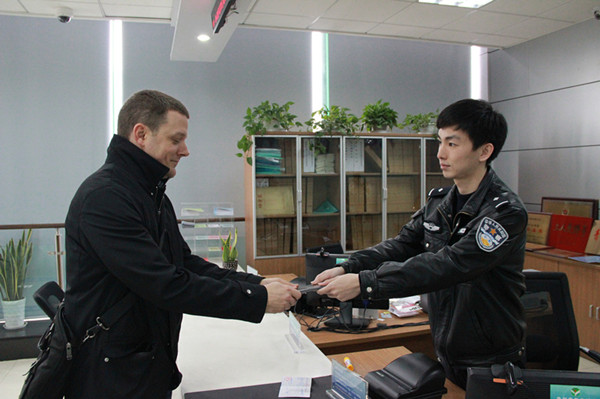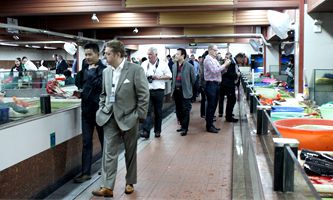Fast-changing Hangzhou eases govt processes

A foreigner registers at the Exit-Entry Administration Service Center in Hangzhou's Binjiang district. [Provided to China Daily]
For Lucas Rondez, a Swiss entrepreneur who has been living in Hangzhou, Zhejiang province, since 2007, the city has a lot in common with his home country. Both are tourist destinations with breathtaking natural scenery.
But there is one striking difference - unlike Switzerland, "changes are happening every day here", said Rondez, CEO of Hangzhou NiChuang Network Technology Co, which specializes in introducing foreign startups to the city.
"The local government here has been encouraging business innovation and the incubation of startup firms, and has offered a lot of favorable policies - for example, financing," he said. "It makes it easier for foreigners to start a company in a fast and convenient way, especially during the past two years.
"Nowadays my clients can register a firm within three days, and all the procedures have been simplified. In the past it would take one or two weeks. Frequently, I had friends contacting me simultaneously to ask about investing in Hangzhou. People just knew that great changes are happening here."
The key for such changes lies in the "Run once at most" campaign, which was born in Zhejiang in December 2016. It aimed to simplify application processes and minimize bureaucratic red tape at all levels to better and more conveniently serve the needs of Chinese and foreigners.
The aim of the reform is to establish a service-oriented ethic in governments and launch a long-term improvement in the way public resources are allocated to businesses and residents. The goal was to enhance the public's "sense of gain and happiness".
For example, in a recent development, the public security bureau in Hangzhou announced last month that it is working to ease the transfer of household residency registrations across the city, so that residents can make changes at the nearest police station rather than traveling all the way back to the stations where the original files are kept.
Since 2017, it has brought a similar concept to 77 public administrative services, including entry and exit affairs. It enabled 320,000 citizens to report lost ID cards and get new ones without undue travel.
The campaign has received warm applause from both the Chinese public and the local foreign community, as governments at all levels push to provide more efficient services thanks to the popularization of e-government based on big data.
"International exchanges have become more frequent since Hangzhou hosted the G20 Summit in 2016," said Liu Xiang, an officer with the Exit-Entry Administration Service Center of the Public Security Bureau in Hangzhou's Binjiang district. To better serve the needs of foreigners, we also provide English versions of the policies for exit-entry on our public WeChat account. They can also make reservations to deal with entry and exit affairs through our app on a daily basis."
China will further simplify procedures for setting up foreign-invested enterprises to promote free trade and investment at high standards, under a decision made at a State Council executive meeting in May chaired by Premier Li Keqiang.
Measures were also adopted at the meeting to establish a uniform e-platform for accessing government services and seeing that things requiring a personal appearance will get done the first time, without the need for a second trip.
"Government services are to serve the public, and hence must be universally accessible. Current technologies have made it possible to have many things done online," Li said.
It was decided that by the end of 2019, at least 90 percent of the service items offered by provincial-level authorities and 70 percent by city and county authorities should be accessible online.
Li Haoyi contributed to this story.
mazhenhuan@chinadaily.com.cn




